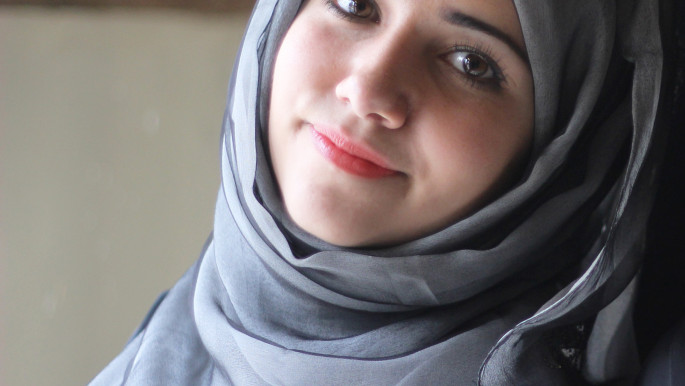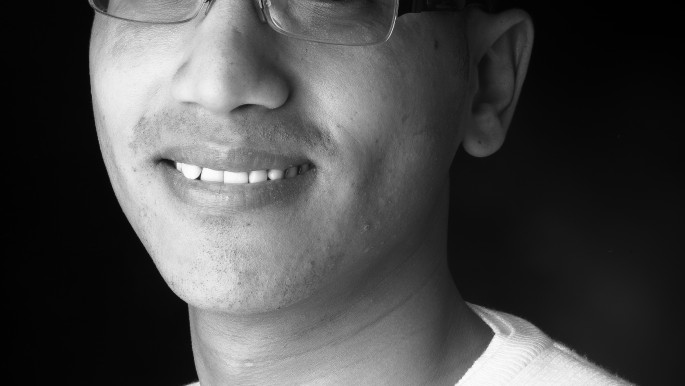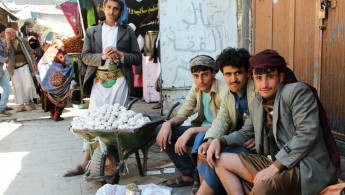Young Yemenis voice their fear of the future
Young Yemenis voice their fear of the future
Feature: On the anniversary of Yemen's uprising, al-Araby al-Jadeed asks young Sanaa residents what they think about the current crisis in Yemen, and who they blame.
6 min read
Young Yemenis are worried about the future (photo Hamza Shiban)
Foreign states are closing their embassies in Sanaa as chaos reigns in Yemen and the Houthi movement tightens its grip on state institutions.
Yemen is in disarray following the Houthi takeover, with the Zaydi Shia group still unable to exert their influence on regions such as Marib, Taiz and southern parts of the country.
Negotiations have so far been fruitless. Anti-Houthi protests are growing and former the president, Ali Abdullah Saleh, seems to be plotting his return, or at least the ascendancy of his son.
In the midst of all this, young Yemenis, who make up the majority of the country's rapidly growing population, are attempting to get on with their lives.
Al-Araby al-Jadeed asked young Sanaa residents to tell us how the crisis was affecting their lives, who they blamed, and what hopes they have for the future.
Nadine Elsofary, multimedia student
"The current crisis is definitely affecting my daily life. Some of my hobbies are photography and filmmaking and to pursue these I need to be outside. Some days it is impossible to go out because of demonstrations and the threat of violence. I am worried about the future for women in Yemen. Women had to fight for their rights before and I fear that we may be taken back in time where women are expected to just stay home, in the kitchen. Women must be allowed to study, go out and work - if they need or choose to. Basically, they should have the same rights as men.
"I blame the politicians and the government for the situation and for not doing more to fix things after the events of 2011. I don't think that the hopes of 2011 have been fulfilled. I think that for many people the situation has gotten worse. However, I feel that we should look to the future in a positive way and work hard to try to improve our country.
"My dream is to complete my education and work in a thriving film industry. I hope that there will be no obstacles because I am a woman. My dream for Yemen is for all Yemenis to live peacefully without the bombings and sectarian violence, that Yemen can experience a government without corruption and achieve proper democracy."
Ahmed Baider, Tour Operator
"In terms of the day-to-day, there is a psychological effect and I'm afraid. There is no state or government, and no safety or security. When I walk in the street I feel as though something could happen to me. In terms of work, my occupation is affected 100 percent, as my source of income, tourism, is practically non-existent.
"I blame every Yemeni citizen because we have to change ourselves before we can change Yemen. I blame the political parties in this country because they demonstrated their failure and their inability to control the country. I blame everyone who betrayed their country. I participated in the 2011 revolution and I was very passionate about a change for the better.
"I don't blame 2011 because it was a picture of love, freedom, peace and change. I blame those who exploit religion and used the revolution for their own benefit and their personal vendettas. I'm a very hopeful person and I hope that the country will emerge out of this. We will live a life of dignity."
Bushra al-Fusail, photographer & feminist
"The crisis is affecting us more emotionally, we are always thinking about what happens next and how things will be, and if we will have to face new challenges soon. It affects us by limiting us from going to a lot of places, and in our daily life it is limiting our ability to be productive. As a woman, I'm afraid of all the political parties in Yemen. All of them are against empowering women, and I think one of the things they have in common is their desire to control women.
"I blame the Yemeni people first and foremost for what is happening. They are the only ones who can change the situation. I hope that Yemenis start believing that positive change is in their hands, and start acting on that basis - not to just be the blind followers of others."
Ahmed al-Wazir
"I am affected financially, as any other citizen is. Yemenis are suffering as a result of the electricity blackouts, the gas shortages, and a lack of basic goods. However, with regards to the security situation, I think that there has been an improvement in the last few months.
"In 2011, most of the country came out against corruption and this is something that we should be willing to sacrifice for, as it is the only way to improve Yemen. But the revolution was taken advantage of, and it was divided between the corrupt forces that exist in the country, thanks to international intervention and the GCC initiative. I hope that I see a united, sovereign country, that can provide a dignified life for all its people, including myself. I hope that the country will stand united in taking important decisions, and placing the country's interest above any personal interests."
A Y, dentistry student
"These crises we've been through have made us feel unsafe. I mean, you never know whether something is going to explode beside you or on your way to university. What most affects us in our daily life is the fear. I've always been worried as a woman in Yemen, especially at these times of crisis that we're going through. Many people say that the Houthis support women's rights and support women. But when I think about it, and I see how women in Sadah are treated it makes me even more terrified. It makes me really worried about what might happen in Sanaa.
"I blame the Yemeni authorities, and also the Yemeni army. How I see it, there's no loyalty to the country itself, most of our army is on the side of different parties, or a sheikh or a tribe - but not for the people of Yemen. Not for the love of Yemen."
Osamah al-Fakih, human rights activist & co-founder, SupportYemen
"I fear about my safety when I'm walking or going out, day and night. I'm not just worried about explosions, but also of the militants in the so-called 'popular committees'. It is easy to be suspected of something if the person at the checkpoint thinks that you look a bit different - it happened to a friend of mine at a checkpoint who was asked to present his ID card to make sure he was Yemeni - purely because my friend is darker. This is not welcome.
"Many actors are responsible for the current situation - the political parties that signed the GCC initiative that ensured immunity for Saleh and those who committed human rights violations. [Former president Abd-Rabbo Mansour] Hadi wasted golden opportunities to establish concrete basics for the National Dialogue and forming a responsible government to respond to people's needs. The international community has a responsibility because of the mistreatment of Yemen and its issues. Recently, the Houthis played a big role in making the situation worse with their irresponsible expansion - they haven't been held accountable for it and they keep committing violations and abuses against those who are against them."
Yemen is in disarray following the Houthi takeover, with the Zaydi Shia group still unable to exert their influence on regions such as Marib, Taiz and southern parts of the country.
Negotiations have so far been fruitless. Anti-Houthi protests are growing and former the president, Ali Abdullah Saleh, seems to be plotting his return, or at least the ascendancy of his son.
In the midst of all this, young Yemenis, who make up the majority of the country's rapidly growing population, are attempting to get on with their lives.
Al-Araby al-Jadeed asked young Sanaa residents to tell us how the crisis was affecting their lives, who they blamed, and what hopes they have for the future.
 |
|
"The current crisis is definitely affecting my daily life. Some of my hobbies are photography and filmmaking and to pursue these I need to be outside. Some days it is impossible to go out because of demonstrations and the threat of violence. I am worried about the future for women in Yemen. Women had to fight for their rights before and I fear that we may be taken back in time where women are expected to just stay home, in the kitchen. Women must be allowed to study, go out and work - if they need or choose to. Basically, they should have the same rights as men.
"I blame the politicians and the government for the situation and for not doing more to fix things after the events of 2011. I don't think that the hopes of 2011 have been fulfilled. I think that for many people the situation has gotten worse. However, I feel that we should look to the future in a positive way and work hard to try to improve our country.
"My dream is to complete my education and work in a thriving film industry. I hope that there will be no obstacles because I am a woman. My dream for Yemen is for all Yemenis to live peacefully without the bombings and sectarian violence, that Yemen can experience a government without corruption and achieve proper democracy."
 |
|
"In terms of the day-to-day, there is a psychological effect and I'm afraid. There is no state or government, and no safety or security. When I walk in the street I feel as though something could happen to me. In terms of work, my occupation is affected 100 percent, as my source of income, tourism, is practically non-existent.
"I blame every Yemeni citizen because we have to change ourselves before we can change Yemen. I blame the political parties in this country because they demonstrated their failure and their inability to control the country. I blame everyone who betrayed their country. I participated in the 2011 revolution and I was very passionate about a change for the better.
"I don't blame 2011 because it was a picture of love, freedom, peace and change. I blame those who exploit religion and used the revolution for their own benefit and their personal vendettas. I'm a very hopeful person and I hope that the country will emerge out of this. We will live a life of dignity."
 |
|
"The crisis is affecting us more emotionally, we are always thinking about what happens next and how things will be, and if we will have to face new challenges soon. It affects us by limiting us from going to a lot of places, and in our daily life it is limiting our ability to be productive. As a woman, I'm afraid of all the political parties in Yemen. All of them are against empowering women, and I think one of the things they have in common is their desire to control women.
"I blame the Yemeni people first and foremost for what is happening. They are the only ones who can change the situation. I hope that Yemenis start believing that positive change is in their hands, and start acting on that basis - not to just be the blind followers of others."
 |
|
"I am affected financially, as any other citizen is. Yemenis are suffering as a result of the electricity blackouts, the gas shortages, and a lack of basic goods. However, with regards to the security situation, I think that there has been an improvement in the last few months.
"In 2011, most of the country came out against corruption and this is something that we should be willing to sacrifice for, as it is the only way to improve Yemen. But the revolution was taken advantage of, and it was divided between the corrupt forces that exist in the country, thanks to international intervention and the GCC initiative. I hope that I see a united, sovereign country, that can provide a dignified life for all its people, including myself. I hope that the country will stand united in taking important decisions, and placing the country's interest above any personal interests."
A Y, dentistry student
"These crises we've been through have made us feel unsafe. I mean, you never know whether something is going to explode beside you or on your way to university. What most affects us in our daily life is the fear. I've always been worried as a woman in Yemen, especially at these times of crisis that we're going through. Many people say that the Houthis support women's rights and support women. But when I think about it, and I see how women in Sadah are treated it makes me even more terrified. It makes me really worried about what might happen in Sanaa.
"I blame the Yemeni authorities, and also the Yemeni army. How I see it, there's no loyalty to the country itself, most of our army is on the side of different parties, or a sheikh or a tribe - but not for the people of Yemen. Not for the love of Yemen."
 |
|
"I fear about my safety when I'm walking or going out, day and night. I'm not just worried about explosions, but also of the militants in the so-called 'popular committees'. It is easy to be suspected of something if the person at the checkpoint thinks that you look a bit different - it happened to a friend of mine at a checkpoint who was asked to present his ID card to make sure he was Yemeni - purely because my friend is darker. This is not welcome.
"Many actors are responsible for the current situation - the political parties that signed the GCC initiative that ensured immunity for Saleh and those who committed human rights violations. [Former president Abd-Rabbo Mansour] Hadi wasted golden opportunities to establish concrete basics for the National Dialogue and forming a responsible government to respond to people's needs. The international community has a responsibility because of the mistreatment of Yemen and its issues. Recently, the Houthis played a big role in making the situation worse with their irresponsible expansion - they haven't been held accountable for it and they keep committing violations and abuses against those who are against them."



